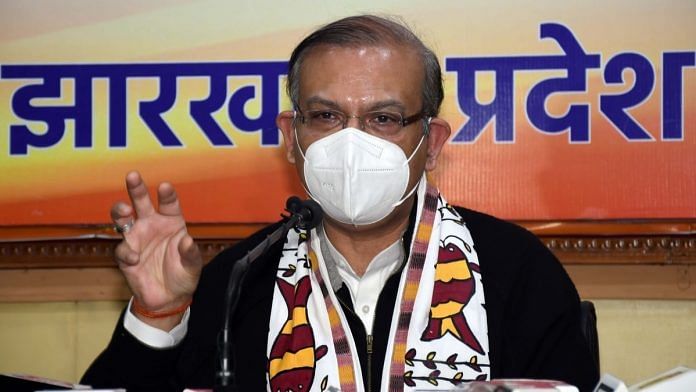New Delhi: The insolvency and bankruptcy process needs to work well to deal with the caseload that will surge come 1 April on account of the pandemic and the subsequent suspension of the provisions of the bankruptcy code, Jayant Sinha, chairman of the Parliamentary Standing Committee on Finance said.
In a telephonic interaction with ThePrint, Sinha said the standing committee and the Narendra Modi government are working to ensure that the National Company Law Tribunal (NCLT) is able to manage the increased caseload.
NCLT is the quasi-judicial body that is handling cases under the Insolvency and Bankruptcy Code (IBC) 2016.
The government and the finance panel are exploring prepackaged bankruptcy — advance agreement to deal with bankruptcy — to ensure that cases do not reach the NCLT but are resolved beforehand and without management control of the stressed company necessarily changing hands, he said.
Finance Minister Nirmala Sitharaman had suspended the IBC for a year until 31 March 2021 to give a respite to firms adversely impacted by the pandemic. This meant that financial institutions and other creditors were not able to initiate insolvency proceedings against a firm even if the dues are unpaid.
However, there are fears that with the pandemic forcing many small businesses to shut down and miss loan repayments, the number of firms being taken into the IBC process may increase from next fiscal.
Also read: Why Budget 2021 is a great chance for Modi govt to bite the bullet on PSU bank privatisation
‘Want to ensure sufficient capacity’
Sinha said that once the moratorium on cases being sent to NCLT is lifted, the insolvency and bankruptcy process will need to work very well to be able to deal with the increase in the caseload probably coming out of the Covid-19 pandemic.
“The caseload is going to increase and therefore we want to make sure that the NCLT has sufficient capacity and is streamlined in its functioning so that it can handle the increased caseload,” he said.
Sinha said the panel and the government are working on prepackaged bankruptcies.
“Prepackaged bankruptcies is a big policy area for the government. So is it possible to short circuit the process to some extent, and be able to do pre-package bankruptcies efficiently? We are seeing if there are any policy suggestions that we can come up with on this model,” he said.
A draft on the possible pre-packaged resolution process was floated by the Ministry of Corporate Affairs earlier this month. It is envisaged as a corporate rescue method which offers the advantage of a quick resolution. This is because it starts off with an informal understanding between the creditors and the promoter, and a resolution arrived at with the management remaining in the hands of the original promoter.
The aim of the process is to resolve the stress faced by the company without the ignominy of it facing a formal insolvency process, but one in which the final outcome has a judicial approval.
On MSMEs
Sinha said the panel is also working on making the insolvency and bankruptcy process efficient for micro, small and medium enterprises as the issues faced by them are different than those faced by a big corporation.
The parliamentary panel is also looking at the issue of cross border insolvency to see how creditors based in India can get value from seized overseas assets of global corporations, he said.
The insolvency and bankruptcy code was one of the biggest reform measures brought in by the Modi government and allowed banks to look for new promoters for stressed firms, bringing in the much needed exit provisions for financial institutions.
Over four years after it was rolled out, the code has managed to resolve some big cases including that of Essar Steel, Alok Industries, Jaypee Infratech and Bhushan Steel, but many still drag on, exceeding the mandated resolution timelines.
Also read: Metro, highways, Jal Jeevan — why Modi govt’s Budget 2021 could feature a big infra push
Infra financing, rural credit next on agenda
In the coming weeks, the finance panel will also take up two new issues for a broader discussion — infrastructure financing for the national infrastructure pipeline and sufficient credit for the rural sector.
The panel will release a detailed report on its recommendations for the IBC as well as infrastructure financing, Sinha said.
‘NCLTs clogged to the hilt’
Anshul Jain, partner, PricewaterhouseCoopers, said NCLTs are “clogged to the hilt”, not just because of insolvency matters but also company law cases.
“During the pandemic, all non-urgent matters were pushed to the back of the roster by NCLT… But they will have to be dealt with now,” he said.
“Besides adding a few benches, many provisions have also been decriminalised by the government. However, despite these efforts, clogging continues. Come 1 April, the number of cases to be dealt with will see a surge,” he added.
Jain also pointed out that one will have to wait and watch to see if the prepackaged resolution process will work.
“The percentage of matters going into liquidation vis-a-vis resolution is way too high and the government wants more cases to see resolution. Prepackaged resolution is a step in that direction. However, one will have to wait and watch whether this alternative mechanism will succeed as this will require bankers to take a commercial call and an overall improvement in the credit culture,” he added.
Also read: India can grow in double digits in post-Covid decade, but needs more reforms — Panagariya



